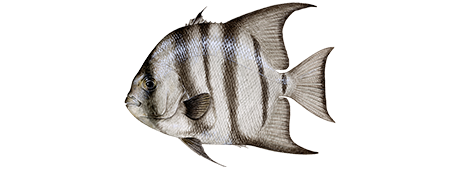
Atlantic Spadefish
The spadefish is a wide-ranging species in the western Atlantic.

Region
South, Northeast
Catch ease
Medium
Habitat
Bay, Ocean
How to identify an Atlantic Spadefish
The Atlantic spadefish is a disk-shaped, silvery fish with about four or five black, irregular bands on its sides that fade with age. The spiny and soft parts of the dorsal fins are nearly separated and the soft front lobes of the soft dorsal and anal fins are prolonged into filaments.
Where to catch Atlantic Spadefish
The spadefish is known to occur from the northeast United States to Brazil and throughout the Gulf of Mexico. It is abundant in shallow coastal waters in the warm temperate parts of its range. Adult spadefish often occur in very large schools of up to 500 individuals in association with submerged objects such as wrecks. Juvenile spadefish are common in estuaries and are often found in very shallow water swimming at an angle resembling dead leaves. The following list includes additional details on where to catch this fish:
| Backflow |
| Birds |
| Coastal Waters |
| Floating Foam and Debris |
| Man-Made Structures |
| Reefs, Wrecks, and Shoals |
| Rocky Sea Floor |
| Bays and Estuaries |
| Channel Entrances |
| Deep Shore Water |
| Jetties and Breakwaters |
| Merging Water |
| Ripples, Currents, Swirls and Sprays |
| Schools |
how to catch Atlantic Spadefish
Spadefish are strong fighters, but tough to hook at times because of their small mouths and finicky nature. Chumming with frozen chopped clams in a weighted wire basket is an excellent way to draw spadefish to a boat. Once to the boat, the real secret of catching spadefish is selecting a hook with small enough dimensions to enable them to be hooked. Clam strips, which resemble one of their favorite foods, jelly fish tentacles, make effective baits but they can also be taken in the chum-line by presenting a fly. Experienced spadefish anglers have discovered that unlike many fish, they tend to bite best on a slack tide.The following list includes common methods and techniques used to catch the Atlantic spadefish: The following are fishing methods used to catch this fish:
Atlantic Spadefish lures, tackle & bait
The following are lures, tackle or bait that can be used to catch this fish:
